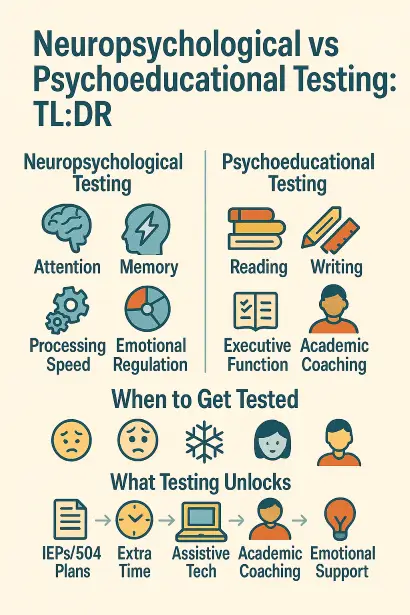
Are you or your child struggling with learning, focus, or school performance—even after working hard? That frustration is common, but the solution might lie in understanding the difference between neuropsychological and psychoeducational testing. These assessments offer deep insight and can direct you toward the right support and strategies.
At Dr. Iospa Psychiatry Consulting, located in the heart of Manhattan, we provide comprehensive evaluations and personalized support tailored to each individual’s unique brain and learning profile. Are you or your child struggling with learning, focus, or school performance—even after working hard? That kind of frustration is common, especially when challenges persist despite tutoring, effort, or support. The next step may be understanding how the brain processes information—not just what the problem looks like on the surface.
That’s where neuropsychological and psychoeducational testing come in. While both assess how a person learns, they serve different purposes. A psychoeducational evaluation focuses on academic achievement—such as reading, writing, and math skills—and is often used to qualify students for accommodations like IEPs or 504 Plans. In contrast, a neuropsychological evaluation takes a broader look at brain functioning, including memory, attention, executive functioning, and emotional factors that may affect learning and daily life.

What’s the Difference: Neuropsychological vs Psychoeducational Testing?
Think of the brain as a complex city.
- A neuropsychological evaluation acts like a city-wide diagnostic — checking the “infrastructure” that drives your brain’s functioning. It probes attention, memory, problem-solving, processing speed, and emotional regulation. Typically conducted by trained neuropsychologists, this testing is especially useful for conditions like ADHD, brain injury, autism, or other neurological concerns.
- A psychoeducational evaluation zooms in on how learning happens in real life. It assesses academic achievement (reading, writing, math), executive functioning such as organization and time-management, social-emotional functioning, and adaptive skills. This evaluation often includes teacher and parent input and real-world observations. It’s invaluable for educational planning and supports, such as IEPs and 504 Plans.
Both are comprehensive but ask different questions:
Neuropsych testing explores how your brain operates.
Psychoeducational testing focuses on how those brain processes translate into learning and performance.
Sometimes these assessments are combined to get the fullest picture.
How Do You Know It’s Time to Get Tested?
Some common signs include:
- Working hard but seeing little progress
- Homework battles or test anxiety
- Freezing on tasks despite understanding
- Struggling with organization or focus
These aren’t signs of laziness or lack of intelligence. They often signal the need for tailored evaluation and support.
Medication and Integrated Care at Dr. Iospa Psychiatry Consulting
At Dr. Iospa Psychiatry Consulting in midtown Manhattan, our approach goes beyond assessment. Suppose your test results indicate that medication could be helpful. In that case, our experienced psychiatrists can prescribe and manage medication as part of your treatment plan—all done in-house for your convenience.
Our doctors collaborate closely, sharing insights and working as a coordinated team to develop a truly individual approach that fits your needs. This integrated care helps optimize your cognitive and emotional well-being, improving focus, mood, and overall functioning.
Whether it’s psychopharmacology, therapy, or school accommodations, we ensure a seamless, personalized path forward, helping you or your child thrive.
What Happens After Testing?
Testing is just the start. The real value comes from understanding your unique profile and applying actionable strategies. You could unlock:
- Extra time or quiet spaces during tests
- Individualized support via IEPs or 504 Plans
- Assistive technology tailored to your needs
- Academic coaching and therapy for executive functions or anxiety
The goal? Clarity, peace of mind, and a roadmap to thrive, not just survive.
Why Psychoeducational Testing Is Just as Important?
Psychoeducational testing often covers academic skills and social-emotional dynamics that neuropsychological testing may not. It provides a deep, practical look at learning in everyday contexts and is essential for educational accommodation planning.
Disclaimer:
The information provided in this guide is for educational purposes only and should not be considered a substitute for professional medical advice, diagnosis, or treatment. Consult with your psychiatrist regarding any specific medication management concerns or questions you may have. Each individual’s situation is unique, and your doctor can provide personalized recommendations based on a comprehensive evaluation of your medical history, symptoms, and needs. Always follow the guidance and instructions provided by your psychiatrist regarding medication management.

